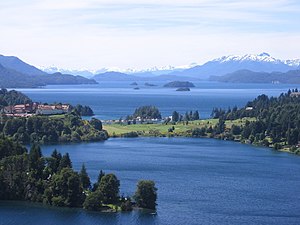Lake: Body of relatively still water, localized in a basin
A lake (from Latin: lacus) is a large body of water (larger and deeper than a pond) within a body of land.
As a lake is separated from the ocean, it is not a sea. Some lakes are very big, and people in the past sometimes called them seas. Lakes do not flow like rivers, but many have rivers flowing into and out of them.



Most lakes on the surface of the Earth are fresh water and most are in the Northern Hemisphere. More than 60% of the lakes of the world are in Canada. Finland is known as The Land of the Thousand Lakes (there are 187,888 lakes in Finland, of which 60,000 are large).
Many lakes are man-made reservoirs built to produce electricity, for recreation, or to use the water for irrigation or industry, or in houses.
If there are not rivers flowing out of the lake (see Endorheic basin), or they are few and small, the lake loses water only by evaporation or because the water flows through the soil pores. Where the water evaporates rapidly and the soil around the lake has a high salt level, as in very dry places, the water of the lake has a high concentration of salt and the lake is called a salt lake. Examples of salt lakes are the Great Salt Lake, the Caspian Sea, the Aral Sea, and the Dead Sea.
Largest lakes by continent
- Africa - Lake Victoria, also the second largest freshwater lake on Earth. It is one of the Great Lakes of Africa.
- Antarctica - Lake Vostok.
- Asia - Lake Baikal is the largest lake that is completely in Asia. The Caspian Sea, the largest lake on Earth, is on the Europe-Asia border (an artificial border) and so both continents share this lake.
- Australia - Lake Eyre, that most of the time is without water; it takes water when it rains a lot.
- Europe - Lake Ladoga, followed by Lake Onega, both in northwestern Russia.
- North America - Lake Superior.
- South America - Lake Maracaibo but it is like a bay because it has a wide opening to sea. The largest freshwater lake of South America is Lake Titicaca, which is also the highest body of water on Earth at 3,821 m (12,507 ft) above sea level where boats can travel.
Notable lakes
- The largest lake in the world by area is the Caspian Sea, with 394,299 km². The largest freshwater lake by area is Lake Superior (82,414 km²), part of the Great Lakes.
- The longest freshwater lake is Lake Tanganyika, with a length of about 660 km. Lake Baikal is the second longest (about 630 km from tip to tip).
- The deepest lake is Lake Baikal in Siberia, with a bottom at 1,637 m (5,371 ft). Lake Tanganyika (1,470 m) is the second deepest lake.
- The highest lake of the world is a small lake (pond) without a name on Ojos del Salado at 6,390 m (20,965 ft). But the highest navigable lake is Lake Titicaca in Peru and Bolivia at 3,812 m (12,507 ft).
- The lowest lake of the world is the Dead Sea, bordering Israel and Jordan at 418 m (1,371 ft) below sea level. It is also one of the lakes with highest salt concentration.
- Lake Enriquillo in Dominican Republic is the only saltwater lake in the world where crocodiles live.
Related pages
References

This article uses material from the Wikipedia Simple English article Lake, which is released under the Creative Commons Attribution-ShareAlike 3.0 license ("CC BY-SA 3.0"); additional terms may apply (view authors). Content is available under CC BY-SA 4.0 unless otherwise noted. Images, videos and audio are available under their respective licenses.
®Wikipedia is a registered trademark of the Wiki Foundation, Inc. Wiki Simple English (DUHOCTRUNGQUOC.VN) is an independent company and has no affiliation with Wiki Foundation.
